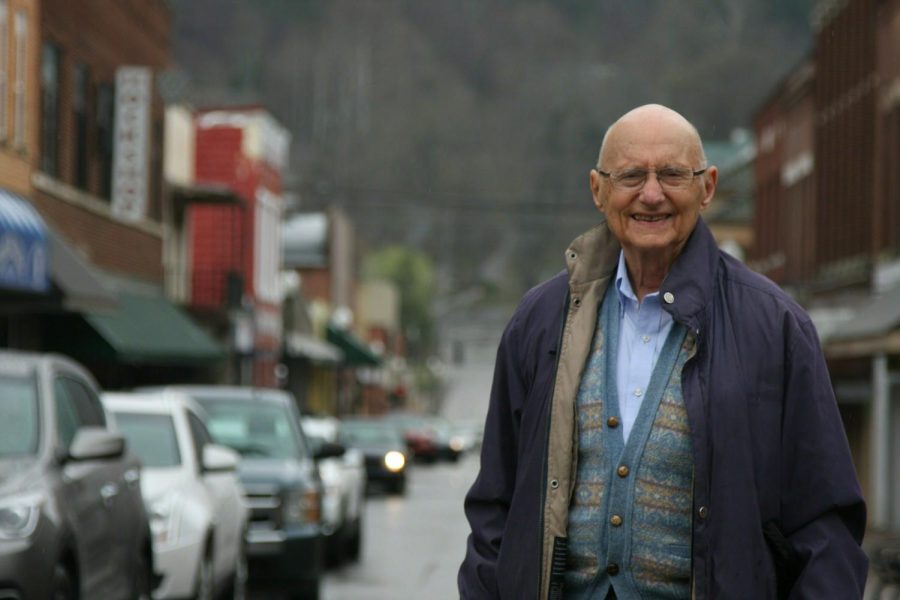Kentucky’s education system and the Holocaust
John Rosenburg, a Holocaust survivor, who resides in Prestonsburg, Kentucky. Photographed for AP News by the Lexington Herald-Leader
April 27, 2022
In recent decades, Holocaust education has become increasingly criticized by the public, but it begs the question: what’s wrong with what we’re teaching about the Holocaust? In our own state of Kentucky in 1981, Tates Creek High School’s Anthony McCord, a history teacher, told his class that the Holocaust had potentially never happened. This incident especially struck a chord with survivor Sylvia Green, who survived living in a Nazi concentration camp, and settled in Winchester, Kentucky. She addressed how she came about sharing her story in the book This is Home Now: Kentucky’s Holocaust Survivors Speak, where she also describes the public reacting to McCord’s teachings, “[My experiences during the war were not] made public until ‘83, when I made a documentary with [former University of Kentucky president] Dr. Otis Singletary- he was the moderator- and three survivors and two liberators. It was shown all over Kentucky. The reason for it was that in ‘81, there was a history teacher at Tates Creek High School who said the Holocaust never happened.” The issue with McCord was so widespread that higher education specialists came forward in support of Holocaust survivors. Even though for some the Holocaust may feel distant, happening across the world, and so long ago, Sylvia’s story occurs also in our own Winchester, Kentucky.
This is Home Now, which was published in 2009, contains several accounts from Holocaust survivors, but has a dedicated section in its introduction to the events of McCord’s class, and another survivor, Emilie Szekely explains that she didn’t start expressing her history until she discovered there was a denier in such close proximity. “I didn’t speak [about the Holocaust], even in New York, never,” Mrs. Szekely elaborated to the author, Arwen Donahue, “[In] New York, I didn’t have to, because there were so many [survivors], I never heard denial. And here I started only because I heard denial.” Kentucky’s supposed ignorance became uprooted, because with the knowledge that these survivors weren’t so far away, it was harder to deny their histories and their existence. This placed the Holocaust from something in History books to a very real and apparent tragedy. As Donahue remarks, “Their willingness to talk openly about their experiences let their contemporaries know that Holocaust history is not only about others, it is also about us. It is not only about then, it is also about now.”
Our own Bourbon County High has multiple programs where students are taught about the Holocaust. One such class, English II and English II Honors, specifically read Night, the memoir by Elie Wesiel, a heartbreaking account of his experiences in Nazi concentration camps. Ms. Carter, the teacher of this class, was interviewed regarding how the Holocaust plays a part in her classes. Despite opinions growing in popularity that the Holocaust is a mandated part of English education, Mrs. Carter addressed that that is not the case, “Teaching the Holocaust is not specifically mandated in the English curriculum, but our standards do include teaching important historical documents. We have chosen to include the memoir Night in our curriculum maps as the anchor text of the narrative nonfiction unit.” So even though it isn’t mandated that the Holocaust be taught as part of our sophomore English classes, the teachers choose to anyway, but why?
Why is teaching about the Holocaust so vital that teachers have chosen to teach it, even if they don’t technically have to? When regarding teaching historical texts, Carter said, “I know it is a cliche, but there is importance in understanding history so as not to repeat the mistakes of the past.” The Holocaust, in particular is such a sensitive subject, as Ms. Carter said, “I think that learning about the Holocaust helps students to examine history and apply what they learn to the political climate of the world today. I also think that reading about the experiences of the survivors helps students examine their own lives and experiences.” There is doubt that the Holocaust was a tragedy, a crime against humanity, but it is to be wondered, why should English teachers, in particular, teach about a complex subject like World War II, until humanity is taken into consideration.
English, writing, and humanities have the difficulty of simultaneously presenting the factual representation of the Holocaust, and also addressing the pain and tragedy of the event and the emotions felt by survivors. Doing so can often be borderline disrespectful or rude, as creating sympathy for the survivors often means that teachers have to simulate the pain they felt. When asked about the difficulties of teaching about the Holocaust, Ms. Carter answers, “It is definitely a difficult subject to talk about because of the horrific things that were done to the innocents. I find it difficult to include all of the material that I feel I should to help my students understand what led up to the Holocaust, how it was able to happen, and the lingering effects even today. It is such a vast subject that I always worry I am doing a disservice to the victims but not being as thorough as I should. Also, it’s just so terribly sad.”
It can also be considered that some Holocaust literature, while incredibly well-written is fiction, as Ms. Carter describes, “I think it is very important to select appropriate texts and materials to share with my students. While many of them have read and loved The Boy in the Striped Pajamas I try to remind them that it is a fictional story told from the perspective of a German.” While books like these can be astounding works of literature, Ms. Carter discusses that she in fact chooses different texts, “ When we teach about the Holocaust I believe we should focus on the victims. They should not be erased from the narrative. That is why I choose to use texts like Night and Maus written by survivors or the family members of survivors.”
The Holocaust had garnered a new form of scrutiny in news and the general psyche, as some individuals think we should move on from teaching the Holocaust, that it is too upsetting for children, or that the way it’s taught in schools is somehow biased. Ms. Carter says, “I know that currently, many in the general public do seem to have a flawed perception of what goes on in the classroom. I think [that] generally most people understand what a tragedy the Holocaust was and see the importance of continuing to educate our students about what happened.” The question of whether or not these complaints can be traced to Bourbon County are also addressed, “Of course, some people have spoken out about the appropriateness of addressing the graphic nature of some parts of the Holocaust, but I have never encountered any complaints as long as I have been teaching it here at Bourbon County.”


